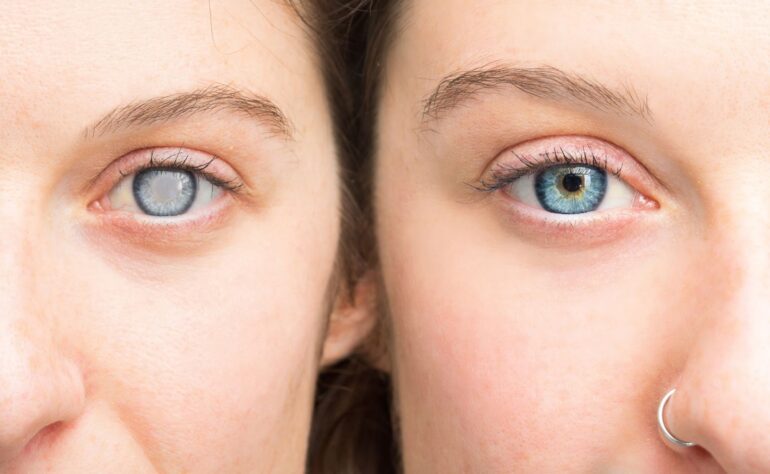TL;DR:
- Two students from UOC developed a mobile app called BegIA that utilizes AI to detect glaucoma, diabetic retinopathy, and cataracts.
- The app analyzes a selfie and provides a diagnosis, guiding users to the appropriate medical specialist if necessary.
- Aimed at regions lacking access to healthcare, BegIA wins the Ramón Molinas Foundation Prize for Social Impact.
- Over 2.2 billion people worldwide suffer from visual impairments, with early diagnosis being crucial.
- BegIA’s creators, inspired by personal experience, train their algorithm using images and are in talks with hospitals to enhance its accuracy.
- The app not only detects diseases but also allows for remote medical monitoring, reducing the need for extensive travel and expenses.
- With the BegIA mobile app expected to hit the market in two years, it represents a significant advancement in eye disease detection and care.
Main AI News:
A groundbreaking mobile application has been developed by two visionary students pursuing their Master’s Degree in Bioinformatics and Biostatistics at the esteemed Universitat Oberta de Catalunya (UOC). This innovative app employs the power of artificial intelligence (AI) to swiftly identify major eye diseases, namely glaucoma, diabetic retinopathy, and cataracts—three leading causes of visual impairment and blindness worldwide.
The app, aptly named BegIA, utilizes AI algorithms to analyze a simple selfie and deliver an accurate diagnosis. In the event of a positive result, the app promptly directs the user to the most suitable medical specialist for further examination and treatment. This groundbreaking project has earned the prestigious Ramón Molinas Foundation Prize for Social Impact at the illustrious 2023 SpinUOC event. SpinUOC, organized by the Hubbik platform, serves as a distinguished platform for entrepreneurship and knowledge transfer.
According to the World Health Organization (WHO), an alarming 2.2 billion individuals globally grapple with some form of visual impairment or blindness. Shockingly, half of these cases could have been mitigated with early detection. It is this compelling statistic that prompted the inception of the BegIA project—begia, meaning ‘eye’ in Basque.
The personal experience of one of the project’s creators further fueled the drive to develop BegIA. Witnessing a loved one afflicted by type 2 diabetes endure a severe deterioration of vision, to the extent of being unable to drive or read, highlighted the urgent need for early detection of diabetic retinopathy—a sight-threatening condition that causes vision loss.
Traditionally, diagnosing eye diseases requires a thorough examination of the retina, necessitating specialized ophthalmologists armed with advanced optical instruments. While individuals in developed countries and urban areas enjoy easy access to such medical services, those residing in remote rural areas or underprivileged regions face significant challenges in accessing these crucial tests.
Enter Igor García Atutxa, a physicist specializing in data analysis, and Francisca Villanueva-Flores, a biochemist with expertise in degenerative diseases. Together, they have harnessed cutting-edge technology to create an innovative ophthalmic pre-diagnosis system capable of identifying multiple eye diseases simultaneously.
At the heart of BegIA lies a neural network powered by an AI algorithm that employs deep learning techniques to discern the presence of eye diseases from a frontal face image captured via a mobile selfie. The algorithm’s development involved training it with a collection of images generously provided by Mexico’s esteemed Instituto Tecnológico y de Estudios Superiores de Monterrey, where Villanueva-Flores serves as a distinguished researcher. García Atutxa and Villanueva are currently engaged in discussions with hospitals and diabetes associations to secure a wider array of images, thereby bolstering the algorithm’s efficacy.
Not content with their groundbreaking algorithm, the duo has also crafted an initial version of the BegIA mobile app for Android devices. Their vision extends beyond disease detection, aiming to create a sophisticated app that incorporates a myriad of additional features. Crucially, this enhanced app will operate seamlessly on low-capacity mobile phones, ensuring accessibility for all users.
The BegIA mobile app serves as a game-changer for both the medical community and potential patients alike. Beyond the early diagnosis of ophthalmic conditions, it offers remote medical monitoring capabilities. Following a diagnosis and treatment plan set by a medical professional, patients can effortlessly track their progress and the evolution of their condition by capturing images with the app. This groundbreaking approach eliminates the need for patients to endure the logistical and financial burdens associated with frequent travel for medical consultations.
With the unwavering commitment to the principles espoused by the WHO’s VISION 2020 project—an initiative dedicated to preventing blindness—the creators of BegIA anticipate its market availability within a two-year timeframe. By continuously expanding their database of images, refining their AI algorithm, and enhancing the app’s functionality, García Atutxa and Villanueva are spearheading a revolution in eye disease detection and management.
Conclusion:
The BegIA mobile app, developed by two visionary students, utilizes AI to rapidly detect major eye diseases like glaucoma, diabetic retinopathy, and cataracts through a simple selfie. The app aims to address the lack of access to healthcare in certain regions and has won the prestigious Ramón Molinas Foundation Prize for Social Impact. With over 2.2 billion people worldwide suffering from visual impairments, early detection is crucial, and BegIA represents a significant advancement in eye disease detection and care. The creators’ personal experience inspired them to train the algorithm using images, and they are in discussions with hospitals to enhance its accuracy. Beyond disease detection, the app enables remote medical monitoring, reducing the need for extensive travel and expenses. The expected market availability within two years highlights the potential of BegIA in revolutionizing eye disease detection and management, contributing to the WHO’s VISION 2020 project’s goal of preventing blindness.

